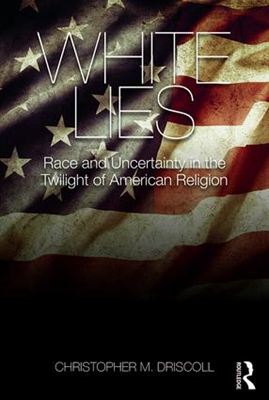Pain, death and deception: The result of “white religion” on men and women of colour.

Responding to the growing visibility of mainstream violence directed at black bodies, White Lies: Race and Uncertainty in the Twilight of American Religion looks into the heart of whiteness and finds what so many women and men of colour have seen before: pain, death, and deception.
Part history, part philosophy, and part theology, Christopher Driscoll traces the shifting definitions of "white religion" from the nineteenth century up to the death of Michael Brown and other racial controversies of the present day. Due to this, Driscoll manages to draw “white religion” into focus in an effort to better address the ways in which whiteness functions religiously in America today.
In this book, modern philosophers and popular imagery are examined in order to isolate the instabilities central to a "white religion," including the inadequacy of this framing concept as a way of describing and processing death, as the book features:
- Provocative arguments linking the concept of "white religion" to the inability to accept physical and social death, as well as contemporary controversies such as Michael Brown.
- In addition to, innovative approaches to the manufacturing of race and religion in American history, philosophy, and theology, while exploring the intersection of race and religion.
- An effort to take seriously the psychological and social concerns of white Americans as inextricably connected to past and present forms of social violence and marginalization.
As a result, White Lies: Race and Uncertainty in the Twilight of American Religion performs a high-wire dance between philosophy and anthropology, God and idol, whiteness, and its own possible 'dying' in the fraught space of America.
For more information, please contact Amy Guest (contact information below).
Amy Guest, Marketing Assistant | Phone: 44 (0)20 7551 9653 | Email: amy.guest@tandf.co.uk
About Routledge, Taylor & Francis Group
Routledge, Taylor & Francis Group is one of the world’s leading publishers of academic journals. We are dedicated to the dissemination of scholarly information, drawing on expertise development since first publishing learned journals in 1798. Taylor & Francis now publish over 1,600 scholarly journals in association with over 460 learned societies and scholarly institutions. We operate from a network of 20 global offices, including Philadelphia, Oxford, Melbourne, Stockholm, Beijing, New Delhi, Johannesburg and Singapore. To learn more about our portfolio, please visit: www.tandfonline.com
Tags:


